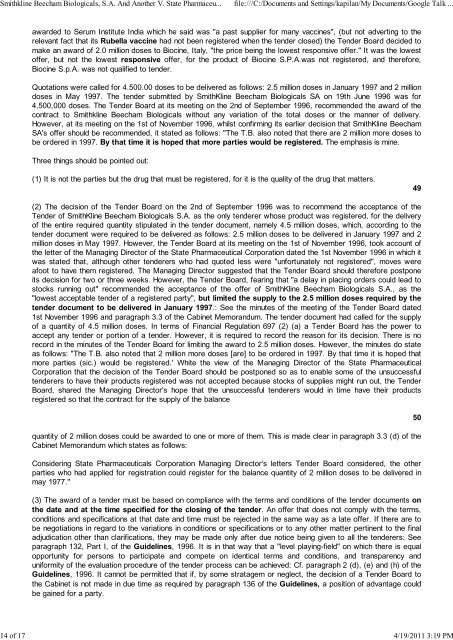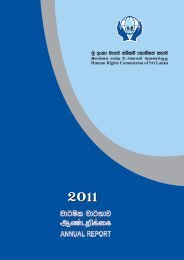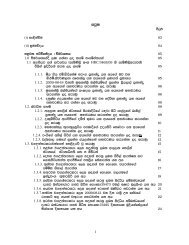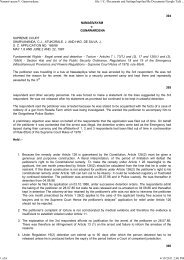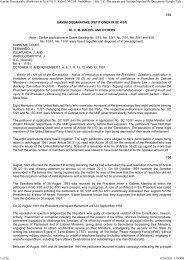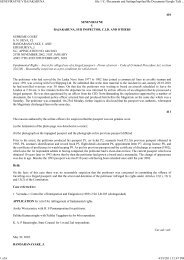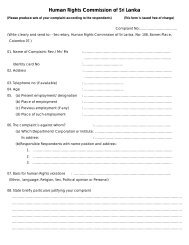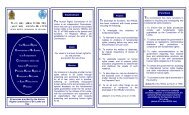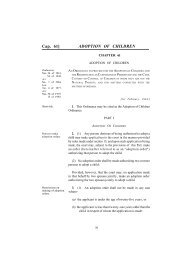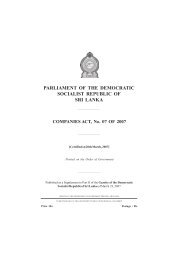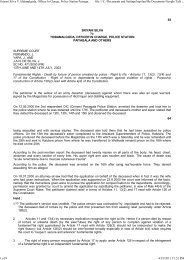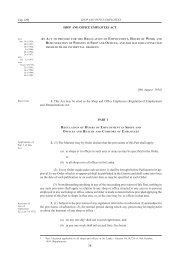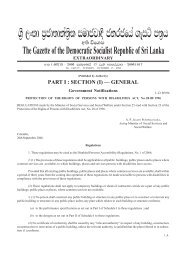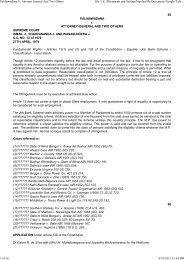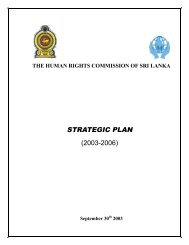Smithkline Beecham Biologic... - Human Rights Commission of Sri ...
Smithkline Beecham Biologic... - Human Rights Commission of Sri ...
Smithkline Beecham Biologic... - Human Rights Commission of Sri ...
Create successful ePaper yourself
Turn your PDF publications into a flip-book with our unique Google optimized e-Paper software.
<strong>Smithkline</strong> <strong>Beecham</strong> <strong>Biologic</strong>als, S.A. And Another V. State Pharmaceu... file:///C:/Documents and Settings/kapilan/My Documents/Google Talk ...<br />
awarded to Serum Institute India which he said was "a past supplier for many vaccines", (but not adverting to the<br />
relevant fact that its Rubella vaccine had not been registered when the tender closed) the Tender Board decided to<br />
make an award <strong>of</strong> 2.0 million doses to Biocine, Italy, "the price being the lowest responsive <strong>of</strong>fer." It was the lowest<br />
<strong>of</strong>fer, but not the lowest responsive <strong>of</strong>fer, for the product <strong>of</strong> Biocine S.P.A.was not registered, and therefore,<br />
Biocine S.p.A. was not qualified to tender.<br />
Quotations were called for 4.500.00 doses to be delivered as follows: 2.5 million doses in January 1997 and 2 million<br />
doses in May 1997. The tender submitted by SmithKline <strong>Beecham</strong> <strong>Biologic</strong>als SA on 19th June 1996 was for<br />
4,500,000 doses. The Tender Board at its meeting on the 2nd <strong>of</strong> September 1996, recommended the award <strong>of</strong> the<br />
contract to <strong>Smithkline</strong> <strong>Beecham</strong> <strong>Biologic</strong>als without any variation <strong>of</strong> the total doses or the manner <strong>of</strong> delivery.<br />
However, at its meeting on the 1st <strong>of</strong> November 1996, whilst confirming its earlier decision that SmithKline <strong>Beecham</strong><br />
SA's <strong>of</strong>fer should be recommended, it stated as follows: "The T.B. also noted that there are 2 million more doses to<br />
be ordered in 1997. By that time it is hoped that more parties would be registered. The emphasis is mine.<br />
Three things should be pointed out:<br />
(1) It is not the parties but the drug that must be registered, for it is the quality <strong>of</strong> the drug that matters.<br />
(2) The decision <strong>of</strong> the Tender Board on the 2nd <strong>of</strong> September 1996 was to recommend the acceptance <strong>of</strong> the<br />
Tender <strong>of</strong> SmithKline <strong>Beecham</strong> <strong>Biologic</strong>als S.A. as the only tenderer whose product was registered, for the delivery<br />
<strong>of</strong> the entire required quantity stipulated in the tender document, namely 4.5 million doses, which, according to the<br />
tender document were required to be delivered as follows: 2.5 million doses to be delivered in January 1997 and 2<br />
million doses in May 1997. However, the Tender Board at its meeting on the 1st <strong>of</strong> November 1996, took account <strong>of</strong><br />
the letter <strong>of</strong> the Managing Director <strong>of</strong> the State Pharmaceutical Corporation dated the 1st November 1996 in which it<br />
was stated that, although other tenderers who had quoted less were "unfortunately not registered", moves were<br />
afoot to have them registered. The Managing Director suggested that the Tender Board should therefore postpone<br />
its decision for two or three weeks. However, the Tender Board, fearing that "a delay in placing orders could lead to<br />
stocks running out" recommended the acceptance <strong>of</strong> the <strong>of</strong>fer <strong>of</strong> SmithKline <strong>Beecham</strong> <strong>Biologic</strong>als S.A., as the<br />
"lowest acceptable tender <strong>of</strong> a registered party", but limited the supply to the 2.5 million doses required by the<br />
tender document to be delivered in January 1997.: See the minutes <strong>of</strong> the meeting <strong>of</strong> the Tender Board dated<br />
1st November 1996 and paragraph 3.3 <strong>of</strong> the Cabinet Memorandum. The tender document had called for the supply<br />
<strong>of</strong> a quantity <strong>of</strong> 4.5 million doses. In terms <strong>of</strong> Financial Regulation 697 (2) (a) a Tender Board has the power to<br />
accept any tender or portion <strong>of</strong> a tender. However, it is required to record the reason for its decision. There is no<br />
record in the minutes <strong>of</strong> the Tender Board for limiting the award to 2.5 million doses. However, the minutes do state<br />
as follows: "The T.B. also noted that 2 million more doses [are] to be ordered in 1997. By that time it is hoped that<br />
more parties (sic.) would be registered.' White the view <strong>of</strong> the Managing Director <strong>of</strong> the State Pharmaceutical<br />
Corporation that the decision <strong>of</strong> the Tender Board should be postponed so as to enable some <strong>of</strong> the unsuccessful<br />
tenderers to have their products registered was not accepted because stocks <strong>of</strong> supplies might run out, the Tender<br />
Board, shared the Managing Director's hope that the unsuccessful tenderers would in time have their products<br />
registered so that the contract for the supply <strong>of</strong> the balance<br />
quantity <strong>of</strong> 2 million doses could be awarded to one or more <strong>of</strong> them. This is made clear in paragraph 3.3 (d) <strong>of</strong> the<br />
Cabinet Memorandum which states as follows:<br />
Considering State Pharmaceuticals Corporation Managing Director's letters Tender Board considered, the other<br />
parties who had applied for registration could register for the balance quantity <strong>of</strong> 2 million doses to be delivered in<br />
may 1977."<br />
(3) The award <strong>of</strong> a tender must be based on compliance with the terms and conditions <strong>of</strong> the tender documents on<br />
the date and at the time specified for the closing <strong>of</strong> the tender. An <strong>of</strong>fer that does not comply with the terms,<br />
conditions and specifications at that date and time must be rejected in the same way as a late <strong>of</strong>fer. If there are to<br />
be negotiations in regard to the variations in conditions or specifications or to any other matter pertinent to the final<br />
adjudication other than clarifications, they may be made only after due notice being given to all the tenderers: See<br />
paragraph 132, Part I, <strong>of</strong> the Guidelines, 1996. It is in that way that a "level playing-field" on which there is equal<br />
opportunity for persons to participate and compete on identical terms and conditions, and transparency and<br />
uniformity <strong>of</strong> the evaluation procedure <strong>of</strong> the tender process can be achieved: Cf. paragraph 2 (d), (e) and (h) <strong>of</strong> the<br />
Guidelines, 1996. It cannot be permitted that if, by some stratagem or neglect, the decision <strong>of</strong> a Tender Board to<br />
the Cabinet is not made in due time as required by paragraph 136 <strong>of</strong> the Guidelines, a position <strong>of</strong> advantage could<br />
be gained for a party.<br />
14 <strong>of</strong> 17 4/19/2011 3:19 PM<br />
49<br />
50


